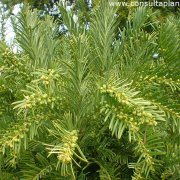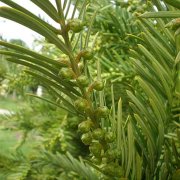Care of the tree Cephalotaxus fortunei or Chinese plum-yew |
|
The genus Cephalotaxus, family Cephalotaxaceae, comprises 11 species of conifers native to Asia. Some species are: Cephalotaxus fortunei, Cephalotaxus sinensis, Cephalotaxus harringtonia, Cephalotaxus wilsoniana. Common names: Chinese plum-yew, Fortune's yew plum, Chinese cowtail piney. This species is native to China. They are dioecious trees (sometimes shrubs) with reddish brown bark, highly branched and open-crowned, reaching 10 meters (32.8 feet) in height. These evergreen conifers have flexible, needle-like leaves 5-9 cm (1.9-3.5") long, glossy dark green on the upper surface and light green on the underside. The flowers are not decorative but the fruits are similar to small plums. To get fruits it's necessary to have female plants and male plants. Chinese plum-yew is used as isolated specimens, in understory, in bushy groups or to form screens. Cephalotaxus fortunei prefers a semi-shaded or shaded exposure; it resists well the heat but not the direct sun of Mediterranean climates. It resists frost down to -8 ºC (17.6 ºF). Fortune's yew plum prefers sandy soils that drain very well and contain organic matter. Water regularly so that the soil does not dry out completely (never water). Adult specimens are more resistant to drought. Fertilize with compost in late winter. Prune only to remove dry branches. Cephalotaxus fortunei is a plant resistant to pests and diseases. Chinese cowtail piney propagates by seeds or cuttings but they are quite slow processes. |
Images of the tree Cephalotaxus fortunei or Chinese plum-yew |
Find plants
Cephalotaxus fortunei or Chinese plum-yew | Care and Growing
© 2026 FavThemes

